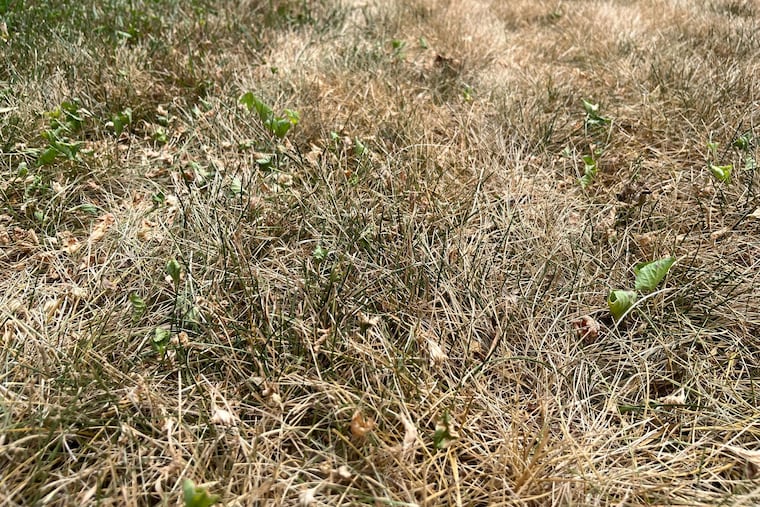Most of New Jersey is ‘abnormally dry’ and Gov. Murphy asks residents to conserve water
"Simple steps, like reducing lawn and landscape watering, go a long way in preserving our water supplies and avoiding the necessity of significant restrictive measures.”

It’s not hard for South Jersey residents to gauge how dry things have become: All they have to do is look at their lawns and gardens.
New Jersey Gov. Phil Murphy this week asked residents and businesses to voluntarily conserve water as most of the Garden State is considered “abnormally dry” based on a federal drought monitor — with some areas possibly now in a drought, according to national data.
The governor’s office said it was taking the action “as the state continues to experience a persistent period of hot and dry weather.”
While conditions have been drier than usual this summer, it has not yet “significantly impacted drinking water supply indicators statewide,” the Department of Environmental Protection said. However, it did not rule out that if the hot and weather pattern persists, it could “adversely affect water supplies.”
Much of South Jersey has abnormally dry conditions as described by the U.S Drought Monitor, a partnership between the National Drought Mitigation Center at the University of Nebraska-Lincoln, the National Oceanic and Atmospheric Administration, and the U.S. Department of Agriculture.
The U.S. Drought Monitor map suggests some counties in the north-central part of the state are experiencing moderate drought conditions. However, the monitor defines a drought more broadly than the state’s DEP.
What constitutes a drought?
Although there is no hard rule for what constitutes a drought, it’s broadly defined as a period of dry weather over an extended period of time, such as a season, that leads to a water shortage. The drought monitor considers soil moisture, stream flow, and rainfall.
An abnormally dry period means, for example, that dryness has slowed crop planting or growth.
“Now is the time for New Jersey to be especially mindful of water usage and proactively moderate our consumption,” DEP Commissioner Shawn M. LaTourette said in a statement. “Although our reservoirs and other indicators are healthy, persistent hot and dry weather coupled with the high water demands of summer can quickly impact water supply. Simple steps, like reducing lawn and landscape watering, go a long way in preserving our water supplies and avoiding the necessity of significant restrictive measures.”
LaTourette said the state’s water systems are capable of handling periods of low precipitation. Reservoir levels are near long-term averages, and groundwater supplies are near normal.
How can I save water?
Among the ways to save water: Use rain barrels and drip irrigation (not sprinklers), water only when needed, raise the level of lawn mower blades to promote deeper root growth, use water from dehumidifiers to water plants, and landscape with native plants that tend to need less water.
Conditions in South Jersey have certainly been much drier than normal. The closest available data from the National Weather Service, however, are for Philadelphia. But they indicate the same pattern for July.
July averaged 82.1 degrees through Wednesday, or 3.4 degrees warmer than normal, marked by a high of 99 on the 24th. July saw 1.67 inches of rain, or 2.10 inches less than normal. While June was slightly cooler than normal, the month saw slightly less rain than normal.